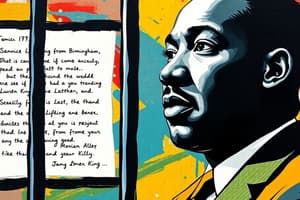Podcast
Questions and Answers
What is one of the four steps of nonviolent campaigns according to King's letter?
What is one of the four steps of nonviolent campaigns according to King's letter?
- Economic sanctions
- Diplomatic engagement
- Negotiation (correct)
- Social media advocacy
How does King differentiate between just and unjust laws?
How does King differentiate between just and unjust laws?
- Just laws uphold human dignity while unjust laws deny basic human rights. (correct)
- Unjust laws are always considered obsolete.
- Just laws are always enforced by the government.
- Unjust laws are automatically repealed by public opinion.
What does King suggest is a consequence of waiting for social justice?
What does King suggest is a consequence of waiting for social justice?
- Perpetuation of injustice (correct)
- Increased public support for civil rights
- A slowdown in systemic oppression
- Improvement of racial relations over time
What is a key reason King provides for engaging in civil disobedience?
What is a key reason King provides for engaging in civil disobedience?
What aspect of Christian ethics does King tie to his argument for equality?
What aspect of Christian ethics does King tie to his argument for equality?
Which concern did the clergymen express regarding King's actions in Birmingham?
Which concern did the clergymen express regarding King's actions in Birmingham?
What is King's perspective on breaking unjust laws?
What is King's perspective on breaking unjust laws?
Why does King emphasize the urgency of the Birmingham protests?
Why does King emphasize the urgency of the Birmingham protests?
Flashcards
Just Laws
Just Laws
Laws aligned with moral principles and human dignity.
Unjust Laws
Unjust Laws
Laws that violate moral principles and deny basic human rights.
Civil Disobedience
Civil Disobedience
Nonviolent breaking of unjust laws to protest inequality.
Nonviolent Direct Action
Nonviolent Direct Action
Signup and view all the flashcards
Four Steps of Nonviolent Campaigns
Four Steps of Nonviolent Campaigns
Signup and view all the flashcards
Urgency in Social Justice
Urgency in Social Justice
Signup and view all the flashcards
Critique of Waiting
Critique of Waiting
Signup and view all the flashcards
Christian Ethic Connection
Christian Ethic Connection
Signup and view all the flashcards
Study Notes
Background and Context
- King wrote the letter in response to criticism from eight white clergymen in Birmingham, Alabama.
- The clergymen criticized King's methods, advocating for a more gradual approach.
- King was imprisoned for leading nonviolent protests in segregated Birmingham.
Key Arguments in the Letter
- King argues that segregation is inherently unjust, necessitating nonviolent direct action against systemic injustice.
- He outlines four steps in nonviolent campaigns: fact-finding, negotiation, self-purification, and direct action.
- King distinguishes between just and unjust laws, defending the necessity of breaking unjust laws while respecting just ones.
- He clarifies that civil disobedience is a moral response to unjust laws, carried out peacefully.
- King addresses concerns about the timing of the Birmingham protests, emphasizing the urgency and necessity for rapid change in response to systemic injustice.
- He counters the criticism of his actions as untimely by highlighting historical injustices and systemic oppression requiring immediate action.
Concepts and Ideas Presented
- Just and unjust laws: King differentiates between just laws, aligning with moral law and human dignity, and unjust laws, violating these principles.
- Civil disobedience: King advocates for nonviolent civil disobedience against unjust laws as a moral imperative.
- Patience and urgency: King emphasizes the need for both patience in preparation and urgency in addressing entrenched injustice.
- The Christian ethic: King grounds his arguments in Christian principles of love, justice, and equality.
- The morality of waiting: King critiques the call for patience, highlighting how waiting perpetuates injustice and is essentially complicity in the problem.
Impact and Legacy
- The letter is a cornerstone of the civil rights movement, powerfully articulating King's philosophy of nonviolent resistance and the moral duty to oppose injustice.
- It continues to influence social justice activists today.
Studying That Suits You
Use AI to generate personalized quizzes and flashcards to suit your learning preferences.




